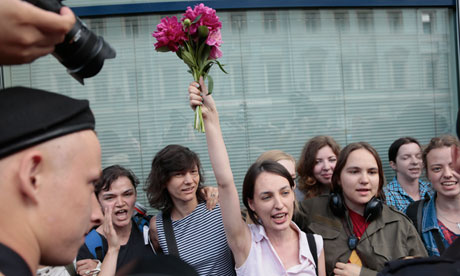
A police officer watches gay rights activists gather near the Duma before the new law was passed. Photograph: Ivan Sekretarev/AP
Russia 's parliament has unanimously passed a federal law banning gay "propaganda" amid a Kremlin push to enshrine deeply conservative values that critics say has already led to a sharp increase in anti-gay violence.
The law passed 436-0 on Tuesday, with just one deputy abstaining from voting on the bill, which bans the spreading of "propaganda of non-traditional sexual relations" among minors.
The law in effect makes it illegal to equate straight and gay relationships, as well as the distribution of material on gay rights . It introduces fines for individuals and media groups found guilty of breaking the law, as well as special fines for foreigners.
Minutes after passing the anti-gay legislation, the Duma also approved a new law allowing jail sentences of up to three years for "offending religious feelings", an initiative launched in the wake of the trial against the anti-Kremlin punk bandPussy Riot .
The two laws were widely criticised by Russia's marginalised liberal and human rights communities and come amid a wider crackdown against independent civil activity in the country.
"I have sincere contempt for the Duma's deputies. All, including the so-called opposition. You have now brought fascism to my country," wrote Yelena Kostychenko, a journalist at the independent Novaya Gazeta newspaper.
International rights groups have called the current situation in Russia the worst human rights climate in the post-Soviet era.
The two laws vastly boost the power of the Russian Orthodox church, a religious body that professes total allegiance to the state. Putin, who often makes a show of his faith, has increasingly called upon the church to fill his own ideological vacuum following a contested presidential election last year, accompanied by unprecedented protests against him.
The case against Pussy Riot – in which three members were found guilty of "hooliganism motivated by religious hatred" after performing an anti-Putin anthem inside a Moscow church – was widely seen as the launch of an ultra-conservative agenda.
Russia's anti-gay law, whose text was softened to remove explicit referrals to "homosexual propaganda", introduces fines of up to 100,000 roubles (£1,975) for individuals who have used the media or internet to promote "non-traditional relations". Organisations can be fined up to 1m roubles and closed down for up to 90 days.
The bill, which must be signed by Putin to become law, also says foreigners can be detained for up to 15 days and deported, as well as fined up to 100,000 roubles, for breaking the law.
International gay rights activists, including British campaigner Peter Tatchell and US activist Dan Choi, have regularly travelled to Russia to support the country's struggling gay rights movement.
Russian activists insisted they would not halt their work. "It was totally expected – I don't take today's decision as the end of something," said Igor Kochetkov, the head of LGBT Network, a St Petersburg-based group.
"We insist on equal rights for all and we will continue to stand up against those patriarchal values that are today being actively promoted by the church and the government. We are doing this because we think these values, these norms, don't fit into a modern society."
"The government is using these instincts – homophobia, xenophobia – to justify its policies against an independent civil society," Kochetkov said. "They are making enemies out of us – not just LGBT society, but any group in society that doesn't agree with their current politics."
Clashes broke out in front of the Russian parliament on Tuesday, as around 300 activists gathered to protest for and against the bill. Police said 20 people were detained.
No comments:
Post a Comment